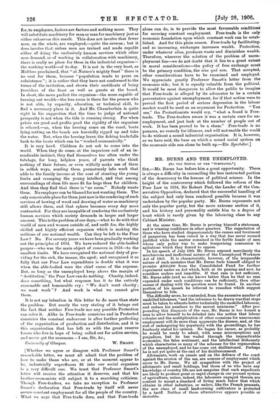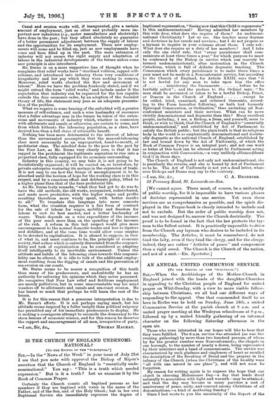MR. BURNS AND THE UNEMPLOYED. (To THE EDITOR OF THE
" SPECTATOR...I
Sin,—Mr. Burns has before him a great opportunity. There is always a difficulty in reconciling the less instructed portion of the democracy to the lessons of political science. In the height of the controversy which followed the reform of the Poor Law in 1834, Sir Robert Peel, the Leader of the Con- servative Opposition, declared that the successful handling of the subject had only been rendered possible because it was undertaken by the popular party. Mr. Burns represents not only the popular party, but the more extreme section of it, and his history and personality entitle him to a degree of trust which is rarely given by the labouring class to any Cabinet Minister.
At the same time, Mr. Burns is proving himself a statesman, and is winning confidence in other quarters. The expectation of
those who have studied dispassionately the causes and treatment of pauperism has been raised in a way that has never seemed justified while the matter remained in the feeble hands of men whose only policy was to make temporising concession to agitations which they feared to oppose. In his speech of July 19th Mr. Burns exposed mercilessly the mischievous and ineffectual nature of the Unemployed Workmen Act of 1905. It is characteristic, however, of the irreparable nature of such mistakes that Mr. Burns feels himself obliged to promise £200,000 from the Consolidated Fund for further
experiment under an Act which, both at its passing and now, he
considers useless and impolitic. If that sum is not sufficient, Mr. Burns adds (and no one knows better than he that no sum
expended under such conditions can be sufficient), then other means of dealing with the question must be found. In another portion of his speech he referred to remedies which suggest themselves to him.
The difficulty arose, he contended, from the excessive number of unskilled labourers, "and the inference to be drawn was that steps must be taken to educate better technically the unskilled labourer, and reduce his numbers to the merest minimum." After pro- pounding this diagnosis of the case, Mr. Burns is too honest a man to allow himself to be deluded into the notion that labour colonies and the multiplication of other occasions for uneconomic employment will do more than aggravate the disease, and, at the risk of endangering his popularity with the groundlings, he has fearlessly stated his opinion. He began his career, as probably he would be ready to admit, with some misconceptions and prejudices, but he has waded through the impracticable economics, the false sentiment, and the intellectual dishonesty which characterise so many of the schemes for the regeneration of the unemployed, and he has come out disillusioned. Perhaps he is not yet quite at the end of his disillusionment. Allotments, work on canals and on the defence of the coast against the erosion of the sea, are sources of employment which
occur to Mr. Burns. We all sympathise with the project of allotments and small holdings, but those of us who have any knowledge of country life are not sanguine that such expedients are likely to produce great or rapid change in our present system
of agriculture, unless, indeed, the labourers engaged therein are content to accept a standard of living much below that which obtains in other industries, or unless, like the French peasants, the new class of small land-owning cultivators is protected by a tariff. Neither of these alternatives appears possible or desirable. Canal and erosion works will, if inaugurated, give a certain amount of employment, just as other and probably more im- portant new industries (e.g., motor manufacture and electricity) have done in the past ; but they afford absolutely no guarantee of a better permanent adjustment between the supply of labour and the opportunities for its employment. These new employ- ments will come and be filled up, just as new employments have come and been filled up in the past. The mere extension of industry will not secure the right supply and adaptation of labour in the industrial developments of the future unless some new principle is also introduced. Mr. Burns is on a more suggestive line of thought when he complains that relief works have "sterilised volition, sapped self- reliance, and introduced into industry those very conditions of irregularity and low pay which they were seeking to remove. Moreover, relief works checked the flow and movement of labour." Here we have the problem fearlessly stated, and if we might extend the term "relief works," and include under it the expectation that industry can be organised for the less capable outside the free economic order, by an adoption of the Socialist theory of life, the statement may pass as an adequate presenta- tion of the problem.
What we require is some bracing of the enfeebled will, a greater measure of self-reliance, and such a wise husbandry of resources that a fuller advantage may in the future be taken of the exten- sions and movements of industry which, whether in connexion with allotments and canals or otherwise, are certain to come, and from which hitherto the labouring population, as a class, have derived less than a full share of attainable benefit.
Nothing has been more detrimental to the interest of labour than the unwarranted assumption that the manual-labouring class must necessarily be an unpropertied, hand-to-mouth, or proletariat class. The mischief done to the poor in the past by the Poor Law, as Mr. Burns very clearly sees, is that it has sapped in the proletariat the legitimate aspiration to rise into a propertied class, fully equipped for its economic surrounding. Industry in this country, we may take it, is not going to be Socialistically organised; it will be carried on, as heretofore, by private enterprise venturing its savings in the expansion of trade. It is not easy to see how the fringe of unemployment is to be absorbed until the horizon of hope for the working class is in this respect, and by a conscious effort and deliberate policy, lifted to a higher plane than that of the bare proletariat life. • As Mr. Burns truly remarks, "what they had got to do was to have the old methods, the old works, reorganised, redistributed, and made more productive, with the higher wages and profits resulting therefrom more wisely spent, with better results to all.' To translate this language into more concrete form, what the situation requires is a fair form of contract for the sale of labour for wages, mobility and freedom for labour to seek its best market, and a better husbandry of wages. Trade depends on a wise expenditure of the incomes of the poor much more than on the spending of the incomes of the rich. A reform in this last respect would give more encouragement to the normal domestic trades and less to tipsters and distillers, and at the same time would allow some surplus to be devoted to capitalisation. It is absurd to suppose, in view of what is, and must continue to be, the principle of economic society, that a class which is entirely dissociated from the responsi- bility and task of capitalisation can be considered as adapting itself intelligently to its inevitable environment. Unless the attitude and habits of the labouring class towards this responsi- bility can be altered, it is idle to talk of the additional employ- ment resulting from the digging of canals and the prevention of sea-erosion on our coasts.
Mr. Burns seems to be nearer a recognition of this truth than many of his predecessors, and undoubtedly he has an authority for enforcing his opitdons which they never possessed. He recognises that Poor Law relief and fictitious employment are merely palliatives, but in some unaccountable way his mind wanders off to allotments and canals and sea-coast erosion. He has learnt so much that perhaps he will learn the rest of the lesson.
It is for this reason that a generous interpretation is due to Mr. Burns's efforts. It is not perhaps saying much, but his attitude seems inspired by a fuller insight than political exigency has permitted any of his immediate predecessors to display. He is making a courageous attempt to reconcile the democracy to the stern lessons of economic science, and for this reason he deserves the support and encouragement of all men, irrespective of party.







































 Previous page
Previous page